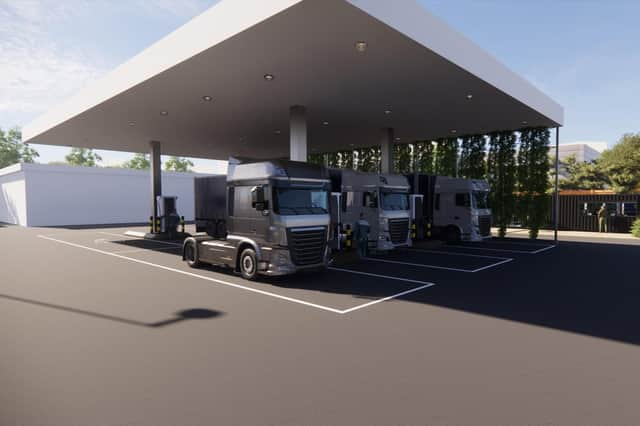Scottish green energy giant SSE pushes button on its first charging hub for heavy goods vehicles


The hub, at Tyseley Energy Park in Birmingham, will accommodate up to four lorries at a time and house powerful 360 kW chargers capable of dispensing up to 300 kilometres of charge within one to two hours.
The firm, part of Perth-headquartered power giant SSE, said the project marked a key milestone in its strategy to help decarbonise the road freight sector. It is estimated that diesel-run HGVs account for 17 per cent of all road transport emissions in the UK despite making up just 5 per cent of vehicles on its roads.
Advertisement
Hide AdAdvertisement
Hide AdSSE has already partnered with a number of transport services and logistics businesses across the UK, including global haulage firm DHL, to accelerate the transition to battery-powered heavy goods vehicles (HGVs). The company plans to build 500 ultra-rapid charging hubs for electric cars and commercial fleets powered by traceable, renewable energy in the UK and Ireland by 2030, with a number of sites already operational.
Ben Brickwood, EV project development manager at SSE Energy Solutions, said: “The development of our first all-electric HGV charging hub at Tyseley Energy Park is a crucial step for SSE as we continue to enable the decarbonisation of Britain’s transport infrastructure and industries. Drawing on our expertise and experience with bus depot electrification and the roll out of EV passenger car hubs, this project demonstrates our commitment to accelerating the transition to electric for all vehicles and building the framework needed to support their rollout.”
Established in 2010, Tyseley Energy Park is owned by the Webster and Horsfall Group and is home to the UK’s largest hydrogen refuelling station and a waste-wood biomass power plant that generates enough electricity to power some 17,000 homes. SSE’s charging hub at the site will include a canopy which is to be formed from a combination of galvanised steel and sustainable timber. It will incorporate a rainwater harvesting system to capture surface rainwater and irrigate a “living green wall” within the site. Last week, SSE said it was ramping up its capital investment to the tune of £2.5 billion as it committed itself to the “big drivers of energy security and decarbonisation”.
Comments
Want to join the conversation? Please or to comment on this article.